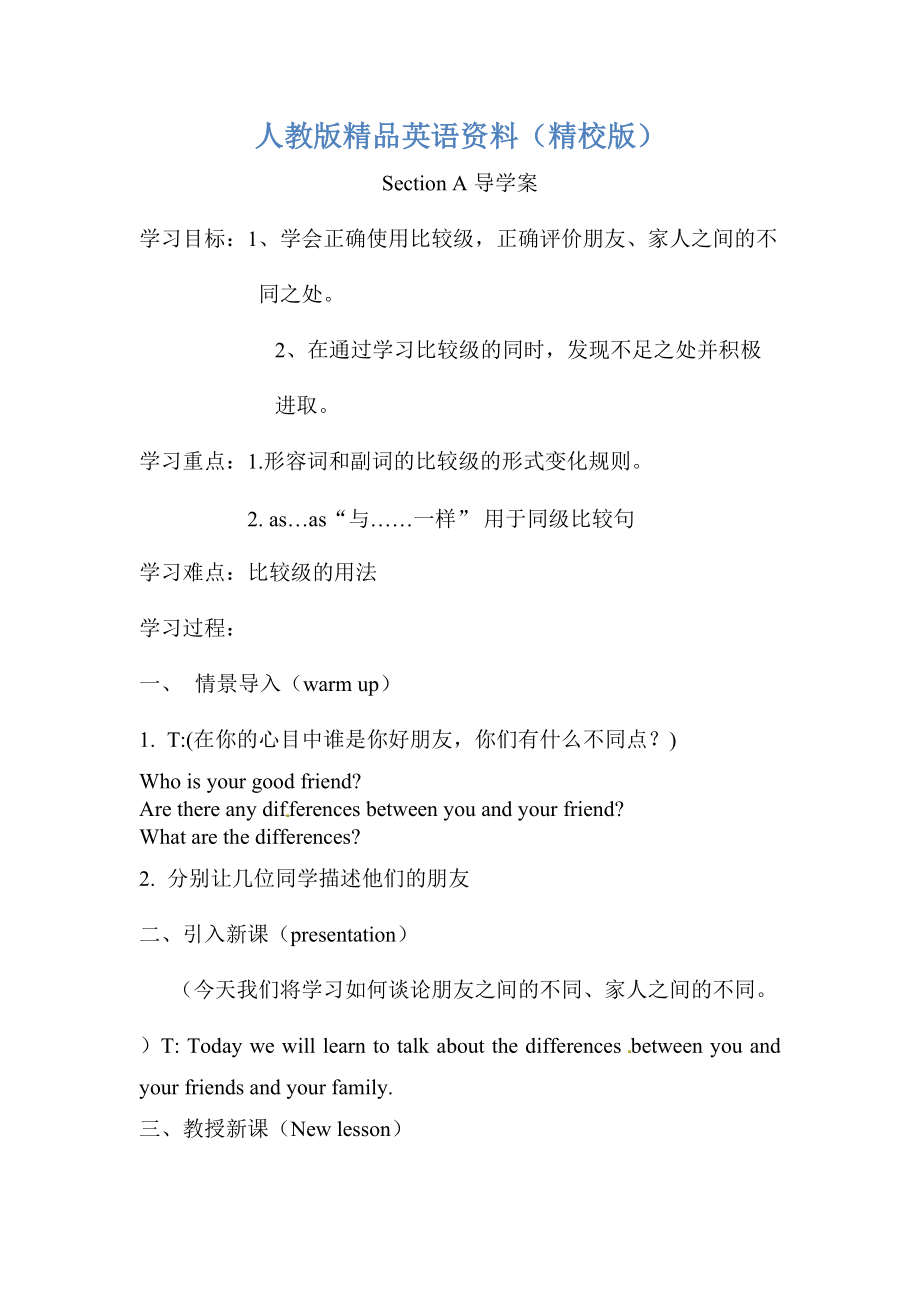《【精校版】人教版八年級(jí)英語(yǔ)上Unit3 Section A 學(xué)案》由會(huì)員分享�,可在線閱讀,更多相關(guān)《【精校版】人教版八年級(jí)英語(yǔ)上Unit3 Section A 學(xué)案(5頁(yè)珍藏版)》請(qǐng)?jiān)谘b配圖網(wǎng)上搜索����。
1、人教版精品英語(yǔ)資料(精校版)
Section A 導(dǎo)學(xué)案
學(xué)習(xí)目標(biāo):1��、學(xué)會(huì)正確使用比較級(jí)����,正確評(píng)價(jià)朋友、家人之間的不同之處����。
2、在通過(guò)學(xué)習(xí)比較級(jí)的同時(shí)�,發(fā)現(xiàn)不足之處并積極進(jìn)取。
學(xué)習(xí)重點(diǎn):1.形容詞和副詞的比較級(jí)的形式變化規(guī)則���。
2. as…as“與……一樣” 用于同級(jí)比較句
學(xué)習(xí)難點(diǎn):比較級(jí)的用法
學(xué)習(xí)過(guò)程:
一����、 情景導(dǎo)入(warm up)
1. T:(在你的心目中誰(shuí)是你好朋友,你們有什么不同點(diǎn)���?)
Who is your good friend?
Are there any differences between you and your friend?
Wh
2�、at are the differences?
2. 分別讓幾位同學(xué)描述他們的朋友
二�、引入新課(presentation)
(今天我們將學(xué)習(xí)如何談?wù)撆笥阎g的不同、家人之間的不同��。)T: Today we will learn to talk about the differences between you and your friends and your family.
三���、教授新課(New lesson)
1����、學(xué)習(xí)1a,讓學(xué)生觀察圖片��。
Who can you see in the picture? Are they twins? Do they look the s
3��、ame?幫助學(xué)生作出正確回答�。
Read the dialogue in the picture. Then talk about Tina and Tara, Peter and Paul.檢查1a的答案并讓學(xué)生舉出更多對(duì)的反義詞。
2��、學(xué)習(xí)1b�����,讓學(xué)生聽(tīng)并給出正確答案�。
3、自由展示�����,(學(xué)習(xí)1c��,)練習(xí)上面圖片中的對(duì)話(huà)并編出關(guān)于另外兩對(duì)雙胞胎的類(lèi)似對(duì)話(huà)����。
4,Listening 聽(tīng)力訓(xùn)練(2a, 2b)聽(tīng)第一遍完成2a, 再聽(tīng)一遍完成2b.讓學(xué)生試著講述聽(tīng)力內(nèi)容����。
5.學(xué)習(xí)2c, 看表格,用兩人小組的形式來(lái)完成任務(wù)����。
6.學(xué)習(xí)2d,分角色朗讀對(duì)話(huà)并試著讓學(xué)生分析其中的短語(yǔ)。
4�、四.活動(dòng)練習(xí)(Group work):1.學(xué)習(xí)3a,3b.讓學(xué)生在課外完成。
2.小組活動(dòng):讓學(xué)生談?wù)勛约旱陌职謰寢屩g的不同之處�����,然后在班上進(jìn)行小組表演。
五���、語(yǔ)法角
形容詞和副詞比較級(jí)變化規(guī)
1. 單音節(jié)以及少數(shù)雙音節(jié)形容詞或副詞大致按以下規(guī)律變化:
(1) 一般在形容詞或副詞后面直接加–er 變?yōu)楸容^級(jí)���。
如:old—older??? high—higher
(2) 以重讀閉音節(jié)結(jié)尾,且末尾只有一個(gè)輔音字母的�,則雙寫(xiě)最后一個(gè)輔音字母,再加-er變?yōu)楸容^級(jí)����。
如:big—bigger thin—thinner
(3) 以“輔音字母+y”結(jié)尾的單詞,則將改y為 i 再加-e
5����、r變?yōu)楸容^級(jí)。
如:busy—busier????????heavy—heavier
(4) 以字母 e 結(jié)尾的單詞����,直接加 –r 變?yōu)楸容^級(jí)。
如:large—larger??????????????free—freer
2. 多音節(jié)以及某些雙音節(jié)形容詞或副詞變?yōu)楸容^級(jí)時(shí)�����,則通常在其前加more變?yōu)楸容^級(jí)。
如:important—more important difficult—more difficult useful—more useful
3.不規(guī)則形式或易錯(cuò)形式:
much / many→more bad / badly / ill→worse
far→
6���、farther / further furthest little→less
few→fewer old→older / elder
六、自我評(píng)估
1.用所給詞語(yǔ)的正確形式填空:
1.The black dog is (thin) than the white dog.
2. I am? (short) than Lucy.
3. ---Is this balloon (big) than yours?
---No, it isn’t .
4. ---Who is ________
7���、__ (strong) , John or Mike? ---Mike is.
5. ---Whose bag is __________ (heavy) , mine or yours? ---Yours is.
二 選擇題
1.????? Bob is ___________ than Tom.
A tall B taller C taller D tallest
2.????? Which is ___________ a hen or a ducking?
A heavy B heavier C heavyer D heavyies
8����、
3.????? He is much ________ than Lily.
A good B better C best D bettest
4.????? Miss Chen is ________than Mr. Zhang.
A popular B more popular C popularest D the more popular
5.????? Question A is ________ than Question B.
A easy B easier C easiest D easyer
9�����、
6.????? The chair is _________ than the book.
A more expensive B expensiver C expensivest D the more expensive
7.????? The basketball is ________ than the tennis.
A big B bigger C the bigger D biggest
8.????? This dress is _______ than my dress.
A beautiful B beautifuler C beautif
10�、uller D more beautiful
9.????? She is __________ than my sister.
A younger B young C youngest D the younger
10.My hair is _______ than your hair.
A long B longer C longest D the longer
11. The flower is ____ than the bees.
A many B more C most D the most
12. My uncle drive
11、s much _____ than my mother.
A better B much better C best D the best
13. Winter is ______ than autumn.
A cold B colder C coldest D colder
14. My father is _____than my mother.
A busy B busier C busyer D busiest
七����、開(kāi)心:通過(guò)學(xué)習(xí)我知道了1、
2�、 3、
加油:這些知識(shí)我還記不牢1���、
2�、 3、
 【精校版】人教版八年級(jí)英語(yǔ)上Unit3 Section A 學(xué)案
【精校版】人教版八年級(jí)英語(yǔ)上Unit3 Section A 學(xué)案

